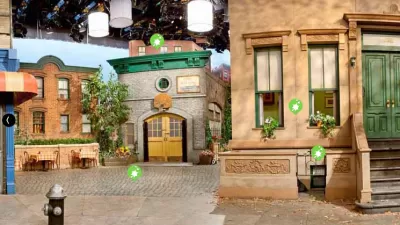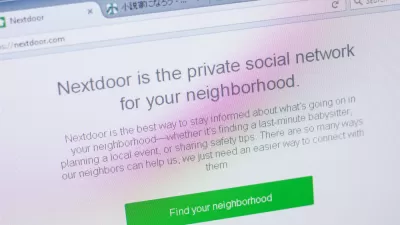Meet Nextdoor, the social network based on proximity, inspired by the conclusion of Robert Putnam’s Bowling Alone that neighborhood social networks make crime go down and test scores go up.

Nancy Scola introduces a relative newcomer to the constellation of social media sites on the Internet: Nextdoor, a neighborhood focused platform. Scola says the idea behind the site is simple: “We’ve become acclimated to using Facebook to connect with friends and family. LinkedIn for work. Twitter for our interests. Yet in 2014 there is no go-to online social network for the people we live among. ‘And that,’ [Nextdoor founder Sarah] Leary says while sitting in Nextdoor’s suite of offices, ‘is kind of crazy.’”
“Since launching its first network 30 miles southeast of San Francisco in Menlo Park in 2011, Nextdoor has grown to 31,000 neighborhoods across the country where people talk about everything from break-ins to favorite eateries to plans for a new dog park.”
The Nextdoor platform isn’t, as Leary says, an “amuse me app,” nor does it aspire to be a neighborhood watch tool.” In fact, a plurality of its conversations consists of recommendations for amenities and facilities.
Scola’s coverage of Nextdoor addresses a lot more of the nuances and implications of the new take on social networking technology, such as issues of privacy and the question of whether, “in a world of affinity networks, can a proximity network scale?”
FULL STORY: Building the Facebook of Neighborhoods

Planetizen Federal Action Tracker
A weekly monitor of how Trump’s orders and actions are impacting planners and planning in America.

Maui's Vacation Rental Debate Turns Ugly
Verbal attacks, misinformation campaigns and fistfights plague a high-stakes debate to convert thousands of vacation rentals into long-term housing.

San Francisco Suspends Traffic Calming Amidst Record Deaths
Citing “a challenging fiscal landscape,” the city will cease the program on the heels of 42 traffic deaths, including 24 pedestrians.

Defunct Pittsburgh Power Plant to Become Residential Tower
A decommissioned steam heat plant will be redeveloped into almost 100 affordable housing units.

Trump Prompts Restructuring of Transportation Research Board in “Unprecedented Overreach”
The TRB has eliminated more than half of its committees including those focused on climate, equity, and cities.

Amtrak Rolls Out New Orleans to Alabama “Mardi Gras” Train
The new service will operate morning and evening departures between Mobile and New Orleans.
Urban Design for Planners 1: Software Tools
This six-course series explores essential urban design concepts using open source software and equips planners with the tools they need to participate fully in the urban design process.
Planning for Universal Design
Learn the tools for implementing Universal Design in planning regulations.
Heyer Gruel & Associates PA
JM Goldson LLC
Custer County Colorado
City of Camden Redevelopment Agency
City of Astoria
Transportation Research & Education Center (TREC) at Portland State University
Jefferson Parish Government
Camden Redevelopment Agency
City of Claremont




























